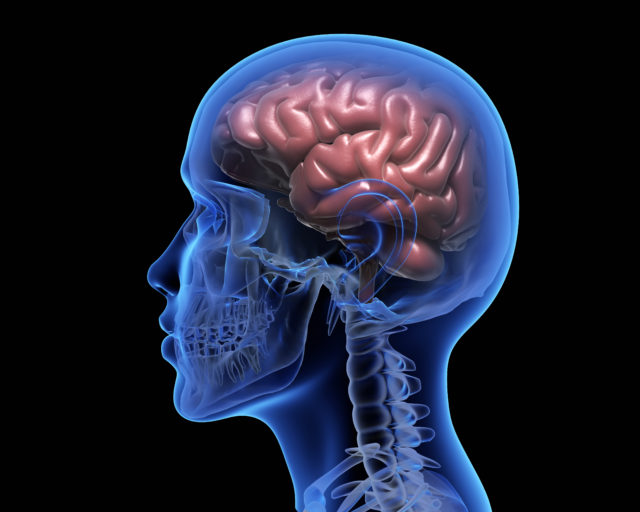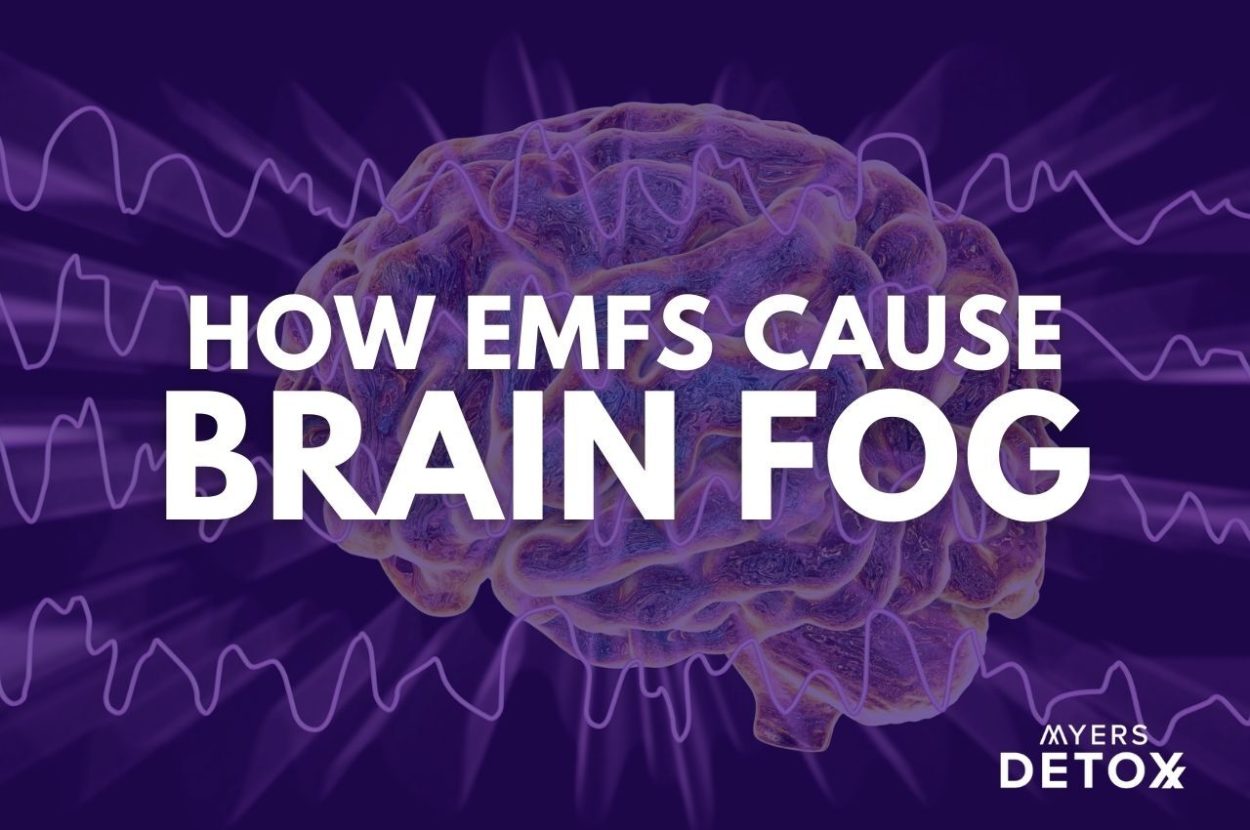Let’s talk about the disturbing way EMFs cause brain fog.
There’s nothing more frustrating than sitting down to do work when your mind has other plans for you. Feeling distracted is one thing, but when your brain literally feels like it’s turned off, the overwhelm and agitation it produces can send you spiraling.
More and more people are complaining of brain fog these days, and the culprit may be streaming right through your airways in the form of electromagnetic frequencies (EMFs).
In this article, you’ll learn:
- What brain fog is
- Why EMFs have an affinity for your brain tissue
- The impact of EMFs on your hormones, mood, and brain function
- How to mitigate EMFs to rebalance your brain and body
What Is Brain Fog?

While “brain fog” isn’t necessarily a medical condition, many people can relate when someone says they feel like they have brain fog.
As the name suggests, brain fog feels like there is a layer of fog covering your brain, and you just can’t peek through to see the light. When you have brain fog you can’t think clearly, it’s hard to focus and stay on track, you can’t pick up new information, and you may feel confused or overwhelmed.
Generally speaking, you’re less productive and efficient, and it can feel like you’re walking through molasses to try to get work done.
There are several reasons someone might experience brain fog, including (but not limited to) poor sleep, unhealthy diet, too much alcohol, general stress and overwhelm, and hormonal imbalances.
While it may seem somewhat harmless, albeit frustrating, brain fog can actually be quite debilitating when it’s chronic. Feeling disconnected and not being able to think clearly can make it harder to connect with people and your inner self.
The Link Between EMFs and Brain Fog
So, how exactly do EMFs impact brain fog? There are several factors that come into play, including the impact that EMFs have on the central nervous system, your circadian rhythm, and your hormones.

EMFs and The Central Nervous System
Many people aren’t aware that the human body is highly electrical. In fact, every system in your body relies on a low-level electrical current that allows vital functions to take place. Of all the systems in your body, however, your nervous system is one of the most electrically charged.
The electrical nature of your body is the primary reason that so many people have trouble with EMFs. Research shows that when your body is exposed to EMFs, the electromagnetic energy from the frequencies is absorbed into your body, changing the natural electric current[1].
When this happens in your nervous system, it can directly impact brain function.
Sleep Disturbance Via Melatonin Suppression
Melatonin is a hormone that’s vitally important to the function of your inner clock – also called your circadian rhythm. Many people refer to melatonin as your “sleep hormone” because it helps to signal your body to wind down at the end of the day, shutting off your mind and allowing you to find sleep.
When melatonin is low, many people find that they can’t fall asleep, and their natural sleep-wake cycle goes off track.
Research shows that EMF exposure suppresses melatonin production, reducing circulating levels and causing issues like sleep disturbance and insomnia[2].
Getting proper sleep is crucial for the maintenance of your entire body, but most people find the first symptoms of sleep deprivation show up in their brain function. Specifically, sleep-deprived people often struggle with concentration, memory, and focus – all signs of brain fog[3].
Increased Stress Hormones
There are enough stressors in our modern-day to day life to make stress management an absolute must for most people. However, even if you’re working with your mindset and using practices like meditation to stay on track, EMFs might be silently thwarting your efforts.
Animal studies indicate that exposure to EMFs from cell phones can directly impact the adrenal glands and increase levels of the stress hormone cortisol[4].
Stress and brain fog go hand in hand – but it’s kind of a chicken-egg situation. Which came first, the stress or the brain fog? While brain fog can certainly increase feelings of stress, research shows that stress may reduce cognitive function.
Specifically, clinical studies show that high cortisol levels lead to issues with memory, executive function, information processing, and social cognition[5].
Furthermore, studies indicate that chronic stress and high-stress hormones may even set the stage for memory problems [6].
Imbalanced Estrogen
Another issue that comes with suppressed melatonin is a disruption in sex hormones. Nothing in your body happens in a vacuum, which is especially true for hormonal balance. In one way another, all of your hormones are connected, and an imbalance in one is sure to drive imbalance in others.
In the case of melatonin, this hormone directly impacts two other hormones that regulate estrogen balance – luteinizing hormone(LH) and follicular stimulating hormone (FSH)[7].
Therefore, when EMFs impact your sleep hormones, it not only disrupts your circadian rhythm, but it can also cause your sex hormones to go off-balance.
Unfortunately, one of the most common side effects that women see when their estrogen is out of whack is brain fog. Whether it comes in the form of forgetfulness, confusion, or an inability to concentrate, imbalanced estrogen levels are a nightmare for cognitive function[8].
Impaired Cellular Communication
For your central nervous system to run smoothly, electrical currents must be sent between nerve cells that communicate messages directing all kinds of behavior, including what to pay attention to, what to focus on, and how to behave.
When communication in the system breaks down, you lose the fluidity of these processes, and the result is altered cognitive function.
Animal research shows that EMF exposure can damage a structure called the myelin sheath.. The myelin sheath is an insulating layer that forms around your nerve cells, assisting in the electrical impulses that send communication throughout the brain and nervous system. When the myelin sheath is damaged, it can inhibit the proper flow of communication, which may result in neurological issues like hyperactivity and poor concentration[9].
How To Mitigate EMFs and Clear The Fog
As you can see, there are several factors that come into play when talking about EMFs and brain fog. Whether it’s directly impacting the nervous system or through imbalanced hormones, EMF exposure sets us up for a struggle when it comes to focusing, concentration, and productivity.
Although EMFs are everywhere in our environment, there are several steps you can take to mitigate your daily exposure – starting right at home.
If you work from home, a great place to begin is in your home office. To lower EMF exposure in your office, try these tips:
- Avoid using your computer when it’s plugged into the charger
- Limit the number of wireless devices you have in your office (printers, fax machines, etc.)
- Use an ethernet cord instead of WiFi if possible
- Keep your cell phone in a separate room while you work, if possible, and take calls from a landline.
In addition to reducing EMFs in your office, you can take measures to reduce EMFs in your home for you and your family. Everyone’s living situation is different, but here are some ideas that might work for you:
- Turn off your WiFi when you’re not using it (especially at night when you’re sleeping)
- Avoid using a Smart Meter, and switch out to a manual reader instead.
- Unplug and turn off devices in your bedroom while you sleep.
- Avoid carrying your cell phone with you when possible, and put it on airplane mode when you know you aren’t expecting calls.
- Use EMF-protection stickers and stones on your WiFi router, phone, computer, and any other Smart Device you have.
But what about when you leave the house? This is a common problem that people come against when they’re trying to reduce EMF exposure in their lives. You can take all of the appropriate measures to reduce EMFs in the home, but once you leave your house, it’s the wild wild West of EMFs.
This is where wearable EMF protection comes in. My personal favorite is the Harmoni Pendant, a lightweight necklace that provides EMF mitigation wherever I go. The Harmoni Pendant works by reducing the impact of EMFs on your energy and electromagnetic field, which in turn reduces the impact it has on your physical body.
Takeaway
If you’ve been struggling with attention, focus, and memory, there may be more going on than you suspect. For many people, managing EMF exposure results in improved neurological function due to the nature of these frequencies and the way they interact with our nervous system and hormones.
Start at home by cleaning up your EMF environment as much as possible. Removing excessive EMFs coming from Smart devices, WiFi, and cell phones should start to produce changes in how you feel all around.
Unfortunately, maintaining a “clean” EMF environment is nearly impossible these days. Reducing EMFs is great, but if you want to really mitigate the impact of these frequencies, I recommend picking up a wearable device like the Harmoni Pendant so you can feel safe no matter where you go.
*These statements have not been reviewed by the FDA. The Harmoni Pendant is not intended to diagnose, treat, cure, reverse, or prevent any disease. It is not intended to replace any other treatments, medication, or healing modalities that may be prescribed by your medical doctor.










